Select Language
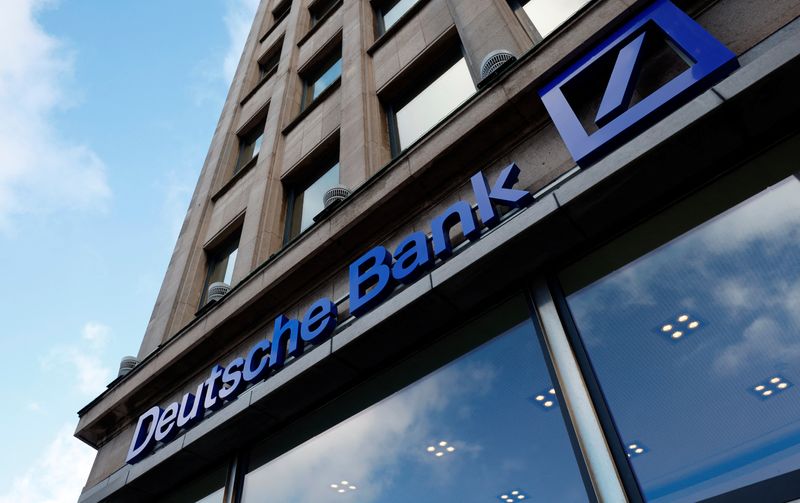
(Reuters) - Deutsche Bank no longer expect the U.S. economy to tip into recession this year, given cooling inflation and the labor market returning to a "better balance" without unemployment rising significantly.
The brokerage earlier expected the economy to enter a mild recession as the Federal Reserve tightened interest rates to tame inflation, narrowing the window for a soft landing.
Deutsche Bank said in a note on Monday that it now expects the U.S. economy to grow by 1.9% this year, on a quarterly average basis, compared with its prior forecast of 0.3%.
"Though the economy continues to face several headwinds – namely, still-tight credit conditions, rising consumer delinquency rates and a slowing labor market – the resilience to date points to a more benign slowdown in 2024 than we had previously projected," said Matthew Luzzetti, the brokerage's chief U.S. economist.
Deutsche Bank still expects the Fed to start easing interest rates from June, but now expects 100 basis points (bps) of rate cuts this year, less than its earlier expectation of 175 bps.
The U.S. economy grew a faster-than-expected 3.3% in the fourth quarter, amid strong consumer spending, with growth for the full year coming in at 2.5%, shrugging off dire predictions of a recession after the Fed's aggressive rate hikes.
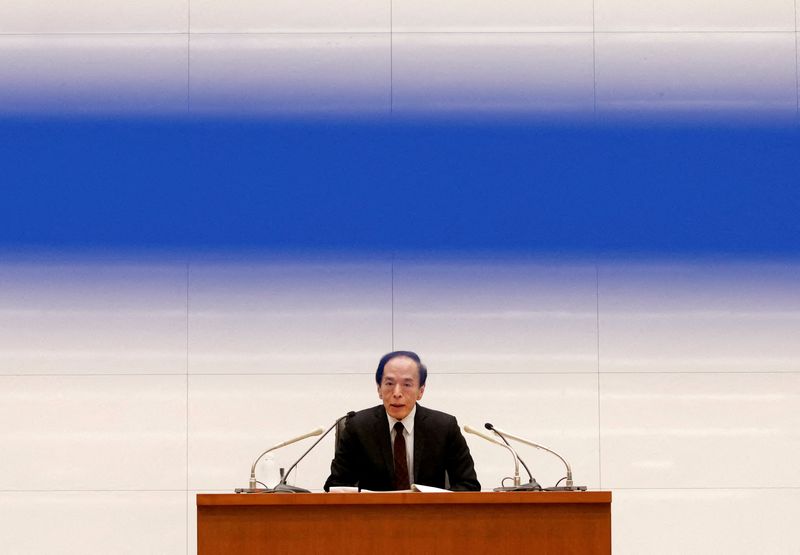
TOKYO (Reuters) - Bank of Japan Governor Kazuo Ueda said on Tuesday the central bank will examine whether to continue its purchases of risky assets, as well as other stimulus means, when sustained achievement of its 2% inflation target comes into sight.
The decision on whether to unload the BOJ's holdings of risky assets, such as exchange-traded funds (ETFs), can be made at a later date, he told parliament.
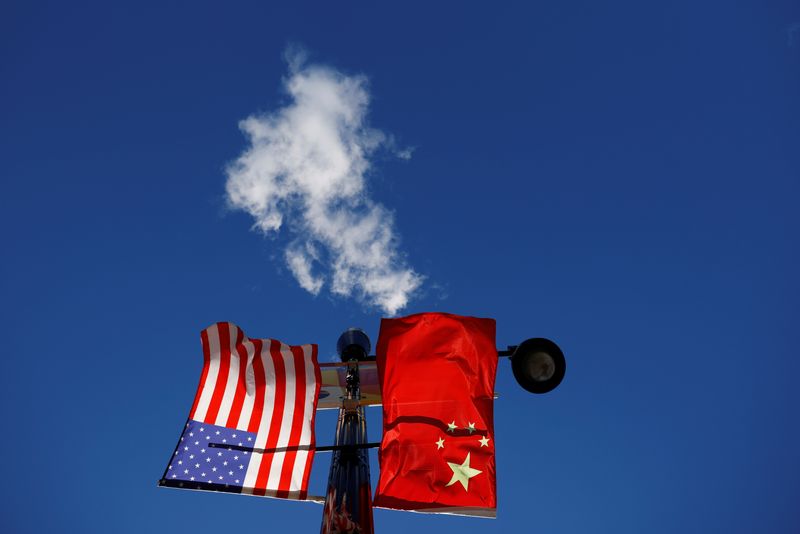
By David Lawder
WASHINGTON (Reuters) -The Biden administration has sent five senior U.S. Treasury officials to Beijing this week for economic talks that will include China's "non-market" policies that are adding excess industrial capacity, a Treasury official said on Monday.
The delegation, led by Treasury Undersecretary for International Affairs Jay Shambaugh, planned to hold frank conversations on Monday and Tuesday as part of the U.S-China Economic Working Group about Beijing subsidies that the U.S. says encourage overproduction of goods, potentially flooding global markets.
Affected industries include electric vehicles, a sector whose development in the United States the Biden administration is trying to boost with its own tax subsidies.
The group will discuss the U.S. and Chinese economic outlooks, investment screening regimes for national security in both countries, and opportunities to cooperate on climate change and debt relief to poor countries, the Treasury official said.
The emphasis on China's industrial subsidies comes as the Biden administration is continuing a review of U.S. tariffs imposed on hundreds of billions of dollars worth of Chinese imports by former President Donald Trump.
U.S. Treasury Secretary Janet Yellen and other senior administration officials have called for the punitive duties of up to 25% to be shifted to a more strategic focus.
Trump, the expected Republican presidential nominee, has signaled he would double down on stronger tariffs if elected, calling for China's most-favored nation trading status to be revoked, a move that would effectively raise nearly all tariffs on Chinese goods. Biden is expected to take a tough but more nuanced approach to China.
The meeting is the third since Yellen and her Chinese counterpart, Vice Premier He Lifeng, launched the group in September alongside the parallel Financial Working Group.
That group met in Beijing in late January, with Treasury officials receiving assurances that Chinese banks were "doing well" despite China's real estate and financial market turmoil, according to Yellen.
The meetings are the first for the economic group in Beijing. The group last met in San Francisco ahead of November's Asia Pacific Economic Cooperation Summit after an initial virtual meeting.
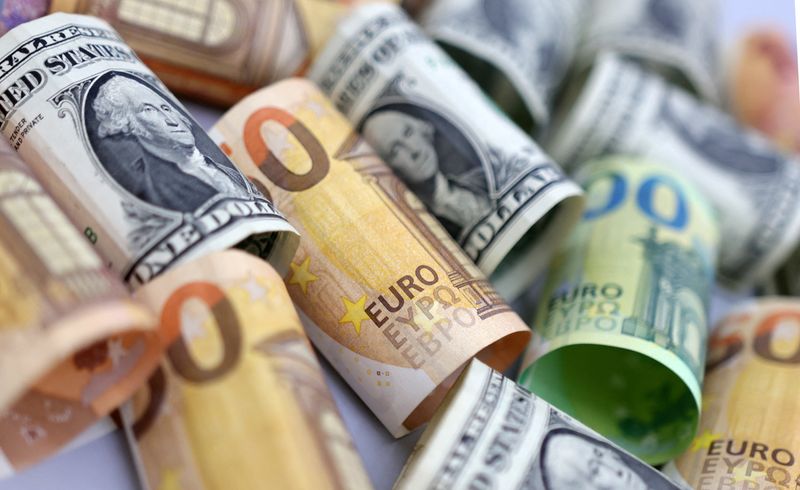
ㅊBy Ankur Banerjee
SINGAPORE (Reuters) - The U.S. dollar was perched near a three-month peak on Tuesday, buoyed by elevated Treasury yields, on growing expectations that the Federal Reserve is unlikely to cut interest rates aggressively this year.
The dollar index, which measures the U.S. currency against six rivals, was at 104.42, having touched 104.60 on Monday, its highest since Nov. 14. The index is up 3% for the year so far after dropping 2% in 2023.
Data on Monday showed U.S. services sector growth picked up in January as new orders increased and employment rebounded, indicating a strong start to the year for the economy and comes after a blowout jobs report last week.
The string of robust U.S. economic data has quashed any lingering hopes of early and steep interest rate cuts by the Fed, with Fed Chair Jerome Powell and other policymakers also pushing back against the notion.
Traders have been scaling back rate cuts bets since the beginning of the year and are currently pricing in only a 15% chance of a cut in March, the CME FedWatch tool showed, compared with a 69% chance at the start of the year.
They are also now pricing in 115 basis points (bps) of cuts this year, compared with around 150 bps of easing anticipated in early January.
"There may still be a bit of room to scale back (more) but it's likely limited given that the disinflation trend in the US is becoming more entrenched and that labour market tightness is gradually easing," said Christopher Wong, a currency strategist at OCBC in Singapore.
Investor focus in Asia will be on the policy decision from the Reserve Bank of Australia later in the day, with the central bank widely expected to stand pat on rates, leaving comments from Governor Michele Bullock in the spotlight.
Investors have moved to push back bets for the first rate cut from the RBA to August, rather than June, with economists polled by Reuters also expecting the central bank to stay steady on rates well into the second half of this year.
The Australian dollar was little changed at $0.64835 ahead of the decision, loitering around its lowest since Nov. 17.
In other currencies, the euro was up 0.02% at $1.0743, while sterling last fetched $1.254, up 0.06% on the day but remained close to the seven-week low it hit on Monday.
The pound's fall on Monday came despite some upbeat economic data. Figures showed that the unemployment rate was likely much lower late last year than previously thought, which could push out rate cuts there, too.
"The tighter than expected UK labour market supports our view that interest rate cuts are still some way off," said Kristina Clifton, FX strategist and economist at Commonwealth Bank of Australia (OTC:CMWAY) in a note.
"We expect the first cut in August versus current market pricing for the June cut."
The Japanese yen strengthened 0.07% to 148.56 per dollar, hovering around a two-month low of 148.90 it touched on Monday.
Japan's real wages fell for a 21st straight month though at a slower pace, while household spending dropped for a tenth consecutive month, showing that inflation outpaced wage recovery and continued to weigh on consumer spending.
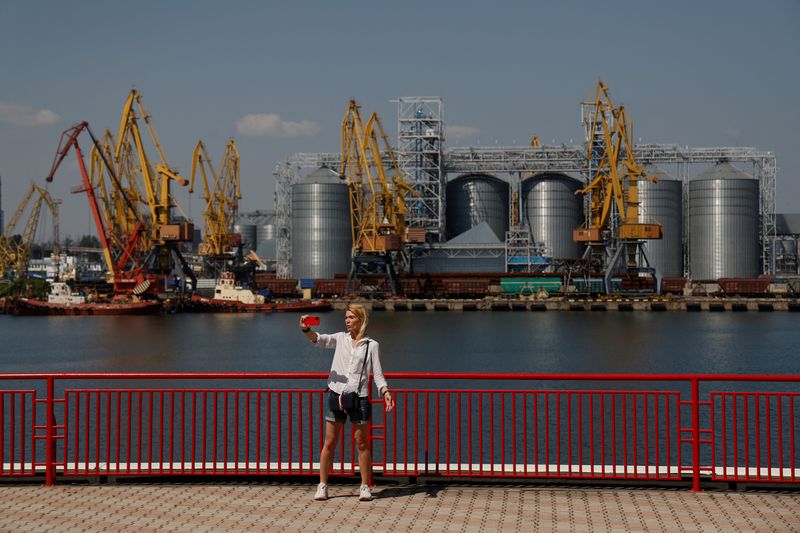
By Pavel Polityuk
KYIV (Reuters) - Ukrainian agrarian unions have asked the government to do everything possible to maintain free access to the European market for their food products, the UCAB association said on Monday.
The European Commission last week said it would extend the suspension of import duties on Ukrainian exports, originally put in place to support the economy after Russia's invasion two years ago, for another year to June 2025.
However, it also proposed measures to limit agricultural imports from Ukraine and offer greater flexibility on rules for fallow land in a bid to quell protests by angry farmers in France and other EU members.
"These preferences were particularly important for Ukraine's agricultural sector... enabling Ukrainian exporters to maintain production and jobs and ensure foreign exchange earnings in 2022-2023," the UCAB business association said on Facebook (NASDAQ:META).
UCAB said exports of food products in 2023 totalled $21.9 billion and accounted for 61% of all exports from Ukraine.
At the same time, the EU's share of total agricultural products from Ukraine in 2023 reached 56.6% or $12.4 billion.
UCAB said that the issue of maintaining the most open access to the EU market would be vital for the country's trade balance in the coming years and the survival of Ukraine's agricultural sector.
"The agricultural community calls on the authorities to facilitate the continuation of preferential access to the EU market for Ukrainian agricultural products and to establish a direct dialogue with European partners," it noted.
The EU suspended import duties, quotas and trade defence measures in June 2022 but cheap Ukrainian grain exports have since sparked protests by governments, farmers and truckers in neighbouring countries such as Poland and Hungary.
Ukraine is a global producer and exporter of agricultural products and has traditionally used sea routes to supply food to countries in North Africa, the Middle East and Asia.
However, after the Russian invasion blocked the country's main Black Sea ports, Ukraine was forced to divert its cargoes through land borders with some goods settling in neighbouring markets and depressing prices.
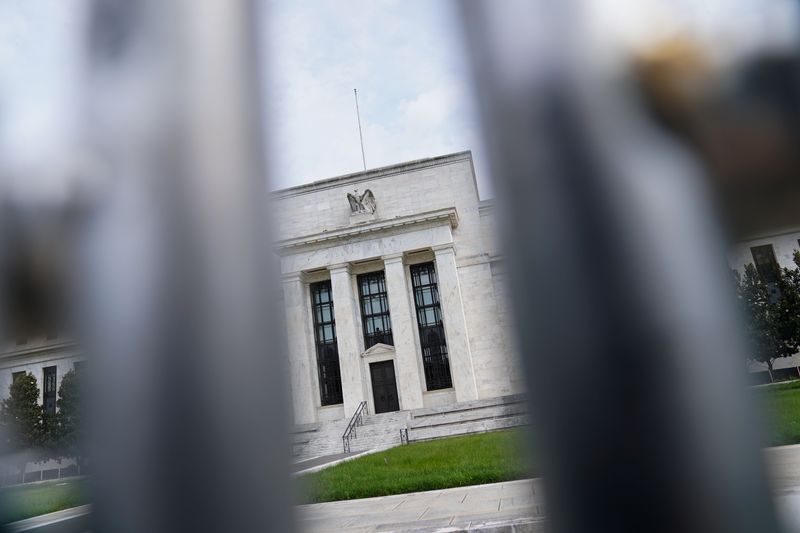
By Ann Saphir and Howard Schneider
(Reuters) -U.S. banks anticipate an increase in demand for loans as interest rates fall this year, even as they further tighten credit standards on some types of loans, according to a Federal Reserve survey of senior bank lending officers published on Monday.
Banks cited deterioration in collateral values and a less favorable economic outlook as reasons they will likely tighten standards on commercial real estate, credit card and auto loans this year, the survey showed. They also expect loan quality to deteriorate across most types of loans, according to the survey.
But the survey also showed a smaller proportion of banks tightening lending standards in the fourth quarter of 2023 compared to the prior quarter, and that loan demand improved slightly.
"The move in the direction away from severe tightening and towards net easing is probably a favorable development for economic activity," wrote JPMorgan economist Daniel Silver.
Fed officials had the survey data when they decided to keep the policy rate steady in the 5.25% to 5.5% range and signal that interest rate cuts are on tap for this year but unlikely before May.
The survey findings are "unlikely to generate any urgency for easing," wrote Dave Sloan, a senior economist at Continuum Economics.
In its post-meeting statement, the Fed notably dropped a reference to the likelihood that tight credit will weigh on economic activity.
Overall the loan officers' survey shows "the worse of monetary tightening for the financial market may be behind us," wrote RSM US economist Tuan Nguyen, with all indicators showing significant improvement since last July, when the Fed delivered the final rate hike in its tightening campaign.
Last week shares of New York Community Bancorp (NYSE:NYCB) plunged after the regional lender reported stresses in its commercial real estate loan portfolio, touching off broader worries about the health of some smaller U.S. banks.
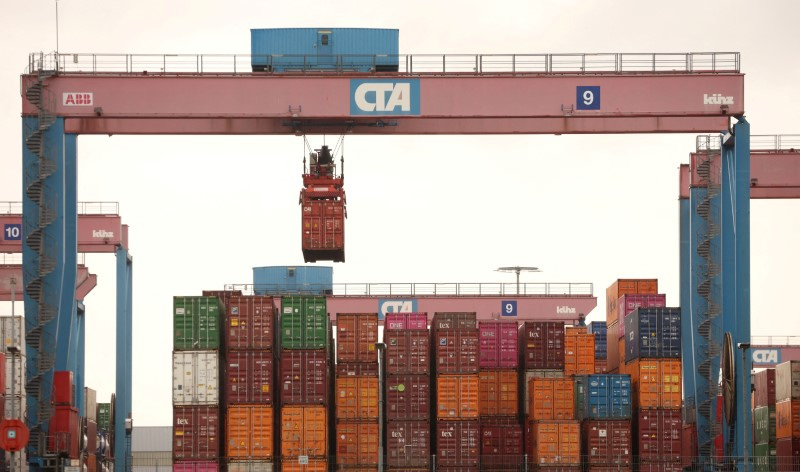
(Reuters) - German exports fell more than expected in December due to weak global demand, data from the federal statistics office showed on Monday.
Exports fell by 4.6% in December compared with the previous month. The result compared with a forecast 2.0% decrease in a Reuters poll.
Imports fell by 6.7% from November, the federal statistics office reported, versus analysts' expectations for a 1.5% decline.
In the year 2023, exports were down 1.4% compared with 2022, while imports to Germany experienced a much sharper decline of 9.7%.
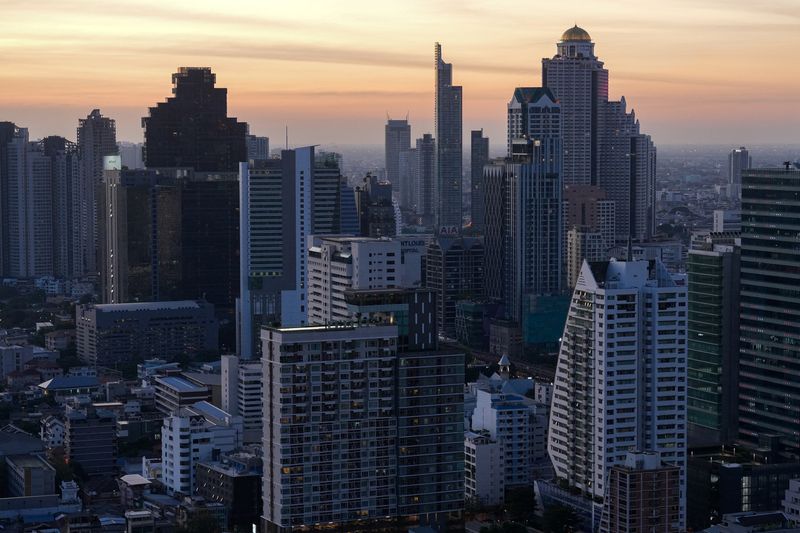
BANGKOK (Reuters) - Thailand's annual consumer inflation rate fell to its lowest in 35 months in January, the commerce ministry said on Monday.
The headline consumer price index (CPI) fell 1.11% from a year earlier, versus a 0.83% year-on-year fall in the previous month.
The figure compared with a forecast fall of 0.82% for January in a Reuters poll.
The core CPI increased 0.52% year-on-year in January, versus a forecast rise of 0.57%.
The decline in January was the fourth in as many months and was driven by government energy subsidies, lower food prices, and a high base effect from last year, the ministry said.
It was the ninth straight month that headline inflation was below the central bank's target range of 1% to 3%.
(This story has been corrected to say inflation fell to 35-month low, not the consumer price index, in paragraph 1)
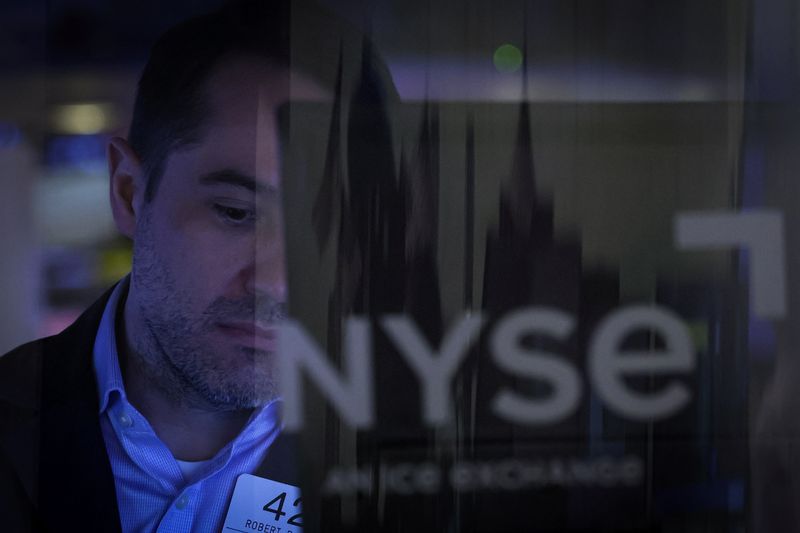
Investing.com -- After Friday's strong jobs report made it likely the Federal Reserve will delay interest rates cuts investors will be focusing on upcoming earnings and economic data to gauge the future path of monetary policy. China is to release what will be closely watched inflation data, oil prices look set to remain volatile and the Reserve Bank of Australia meets. Here’s what you need to know to start your week.
Earning season continues
Earnings season continues in high gear and results this week will help determine if the rally that has taken stocks to record highs can keep going.
The S&P 500 hit a fresh high on Friday after the jobs data, helped by the soaring shares of Facebook parent Meta Platforms (NASDAQ:META) and Amazon (NASDAQ:AMZN), which rose 20% and 8%, respectively, following their corporate results.
All three major U.S. stock indexes notched their fourth consecutive weekly gains.
While most of the big tech names have already reported, there is still a huge batch of S&P 500 companies due to report this week, including Eli Lilly (NYSE:LLY), Walt Disney (NYSE:DIS), ConocoPhillips (NYSE:COP) and PepsiCo (NASDAQ:PEP).
Investors will be paying attention to any insight companies give about 2024, with earnings expected to grow faster than in 2023.
U.S. data
The U.S. economic calendar is considerably quieter after a busy week which included the January jobs report and the Fed’s first meeting of the year.
The main data point to watch is Monday’s ISM services PMI for January with economists expecting activity in the sector to have picked up at the start of the year. The Labor Department is to release the weekly report on initial jobless claims on Thursday.
Investors will also get to hear from several Fed officials during the week including Atlanta Fed President Raphael Bostic, Cleveland Fed President Loretta Mester, Governor Adriana Kugler, Richmond Fed President Thomas Barkin and Governor Michelle Bowman.
Before that, Fed Chair Jerome Powell is to discuss the economy and inflation risks in an interview to be aired on CBS’s 60 Minutes on Sunday night.
Oil prices
Oil prices fell by about 2% on Friday and both benchmarks lost roughly 7% on the week as investors recalibrated expectations for a near term rate cut from the Fed, which could dampen crude demand.
But concerns over spiraling tensions in the Middle East look set to remain to the fore after the United States began retaliatory strikes targeting Iran-backed militants in Iraq and Syria late Friday following a drone attack in Jordan last weekend that killed three U.S. troops.
The U.S. and Britain also launched a fresh round of strikes against Houthi targets in Yemen late Saturday following repeated attacks on Red Sea shipping lanes, which are key for global energy flows.
It is the latest escalation in a conflict that has spread into the Middle East since Oct. 7, when the Palestinian militant group Hamas stormed Israel from the Gaza Strip, igniting a war that has drawn in an array of armed groups backed by Tehran.
China inflation data
China is to publish inflation data on Thursday which is expected to show that deflationary pressures have intensified, with economists expecting January’s consumer price index to come in at minus 0.5% versus minus 0.3% the prior month.
The world’s second largest economy has been dogged by persistently weak demand, a slowdown in the property sector and fragile investor sentiment.
Chinese markets have already had a brutal start to the year. The blue-chip index ended January down 6%, marking a record six-month losing streak.
As the Lunar New Year looms - ushering in the year of the dragon, traditionally the luckiest of the 12 animals in this zodiac - some are hoping the annual travel rush might be a shot in the arm for the economy.
RBA meeting
The RBA is expected to keep interest rates unchanged when it holds its first policy meeting of the year on Tuesday after slower than expected inflation in the fourth quarter prompted markets to bring forward expectations for rate cuts.
Australian consumer price inflation slowed to a two-year low in the fourth quarter, while a sharp deceleration in core inflation fueled bets for a rate cut in May or June.
The RBA has already raised interest rates by 425 basis points to a 12-year high of 4.35% since May 2022 to tame runaway prices. It also left the door open to further tightening if necessary to meet its annual inflation target of 2-3%.
All eyes will be on RBA Governor Michele Bullock as she holds her first post-policy meeting press conference.
--Reuters contributed to this report
Top 5 things to watch in markets in the week ahead
6
Comments (6)

By Rae Wee
SINGAPORE (Reuters) - The dollar rose to an eight-week high against its major peers on Monday as traders clawed back bets for aggressive rate cuts by the Federal Reserve this year in view of a still-resilient U.S. economy.
The yen as well as the Australian and New Zealand dollars meanwhile tumbled to two-month lows, while the euro similarly bottomed at a more than one-month trough of $1.07675 against a stronger greenback.
The dollar index peaked at 104.18, its highest since December.
The Fed repricing has come on the back of Friday's blockbuster U.S. jobs report that far exceeded market expectations, reinforcing Chair Jerome Powell's statement at the conclusion of the central bank's policy meeting last week that a March rate cut was unlikely.
"A one-two punch from Jay Powell's FOMC presser and a very strong nonfarm payrolls report have essentially closed the door on a March rate cut," said Chris Weston, head of research at Pepperstone.
Traders are pricing in just a 20% chance that the Fed could begin easing rates in March, as compared to a nearly 50% chance a week ago, according to the CME FedWatch tool. The odds for a cut in May have also lengthened.
In an interview with the CBS news show "60 Minutes" that aired Sunday night, Powell said the Fed can be "prudent" in deciding when to cut its benchmark interest rate, with a strong economy allowing central bankers time to build confidence inflation will continue to slow.
Fed funds futures now show roughly 137 basis points worth of easing priced in for the Fed this year, down from 150 bps at the end of last year.
The Japanese yen was last 0.15% lower at 148.58 per dollar, having hit a trough of 148.82 earlier in the session.
The Aussie slid 0.33% to $0.6490, while the kiwi lost 0.25% to last trade at $0.6050.
Sterling bottomed at $1.2600, its lowest since Jan. 17.
"The dollar is likely to hold on to its recent gains," said Carol Kong, a currency strategist at Commonwealth Bank of Australia (OTC:CMWAY) (CBA).
Treasury yields also jumped on expectations of higher-for-longer U.S. rates, with the two-year yield, which typically reflects near-term interest rate expectations, last up nearly seven bps at 4.4386%.
The benchmark 10-year yield rose five bps to 4.0829%.
Elsewhere, China's securities regulator vowed to prevent abnormal market fluctuation, after Chinese stocks plunged to five-year lows, but announced no specific measures. [.SS]
That did little to help the yuan, with the offshore yuan last marginally lower at 7.2182 per dollar, pressured by a stronger greenback.
It had fallen to a more than two-week low of 7.2225 per dollar earlier in the session.
"I doubt (the news) will materially support (the yuan) in the near term, unless we get more concrete details," said CBA's Kong.
"So far we've just seen speculation and some media reports talking about further support for the equity market or the property market. But we haven't really seen a lot of details on those easing measures from the Chinese government.
"So I think markets are still pretty doubtful about whether or not those reports will materialise."

